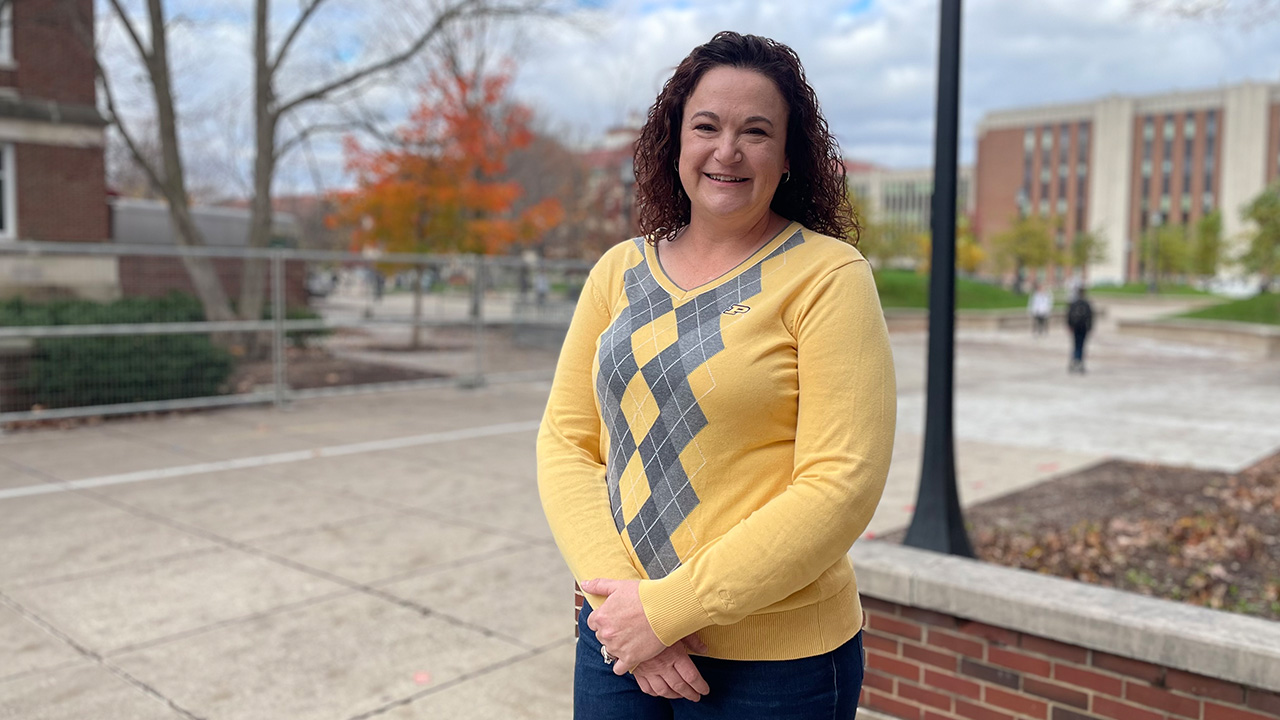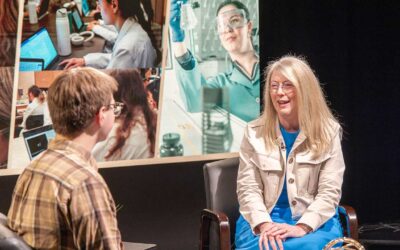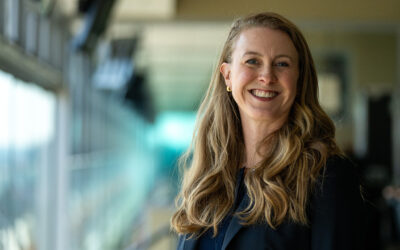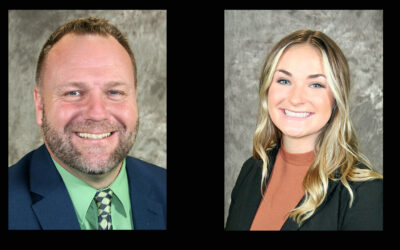Season 2, Episode 5
From a young age, Lisa Taylor (PharmD 2004) knew she was destined for serving in the world of medicine. She hails from a family of healthcare providers—her dad a dentist, her mom a pharmacist, and most of her extended family in some form of medicine.
As a lover of science with a passion for serving others, the medical field just made sense. But with little desire to handle blood on a daily basis, pharmacy was the perfect fit. With several Boilermakers in the family, Lisa says Purdue’s PharmD program was the obvious choice.
Now a compounding pharmacist, Lisa spends her days helping improve the health and lives of the people—and pets—in her community and beyond.
Want to hear more about Lisa’s journey and how she’s helping shape healthier futures? Check out her episode on Living the Pharm Life.
Read Transcript
Isabella Tobin:
You’re listening to Living the Pharm Life, the official podcast of Purdue University’s College of Pharmacy. I’m your host, Isabella Tobin, a PharmD candidate with a passion for telling the stories of our college’s phenomenal and loyal students, faculty, staff, alumni and friends who persistently pursue excellence in all they do.
Lisa Taylor is an alumna of the Purdue College of Pharmacy and a compounding pharmacist in Evansville, Indiana. In this episode, she discusses her journey from college to career and how compounding pharmacy has been a perfect fit. She also dives into what compounding pharmacy is and how it is unique in serving patients from all walks of life.
I want to welcome Lisa Taylor to Living the Pharm Life today. Lisa is a compounding pharmacist in Evansville, Indiana and an alumna of the Purdue College of Pharmacy.
Lisa Taylor:
Yes, I am.
Isabella Tobin:
Thanks so much for being here.
Lisa Taylor:
Thanks for having me.
Isabella Tobin:
All right, so before we jump into compounding pharmacy, I’d like to learn a little bit more about you. How did you get started in pharmacy?
Lisa Taylor:
Well, pharmacy, I think, was always going to be my path. I really liked biology and chemistry in high school. I just really excelled in those. Come from a medical family. My mom’s a pharmacist, and several of her brothers and sisters are pharmacists. My dad’s a dentist. He really wanted me to go that route, but I was not interested in blood and pus and all the things with nasty teeth, so pharmacy was the next logical choice for me. So yeah, I just went that route, and I think it’s turned out great.
Isabella Tobin:
Yeah, I completely get you with the blood and the pus and everything. My grandmother was a nurse, and I got to see a little bit of… I shadowed a nurse before I decide on pharmacy. Not exactly… I can handle it. I would just prefer not to.
Lisa Taylor:
Right. Yeah, we don’t need to get into it every day. No thank you.
Isabella Tobin:
Exactly, exactly. Just a personal preference. If I can hold off, I’ll hold off on that. But really it sounds like your family has a lot of healthcare background.
Lisa Taylor:
Yes.
Isabella Tobin:
Did you always know that you wanted to end up at Purdue?
Lisa Taylor:
Not necessarily. Well, for pharmacy, obviously, yes. That was the option. My dad and my brother both went to IU. So again, my dad wanted me to go to IU, but that really wasn’t in the cards, because I chose pharmacy. And my mom went to Purdue, and her family is all big Purdue people, so we have a little house divided with my parents and my brother. And so Purdue just for pharmacy was the option, and close enough to home, but far enough away, and I’ve just really liked it ever since.
Isabella Tobin:
So we know you wanted to go to pharmacy school. You ended up going to Purdue. How did all of that combine for you? So many pharmacy options. Why Purdue?
Lisa Taylor:
A lot of it family influence, with my mom and then her family. I wanted to do in-state. Could have gone to Butler, but Purdue just was the logical choice for us, since that family connection along with it.
Isabella Tobin:
Yeah. How did Purdue set you up for success?
Lisa Taylor:
Just a lot of options. I had a really good relationship with my advisor, Mr. George, and then Holly Keckler was in Office of Student Services, and I think… I could be wrong, but I feel like my class is one of the beginnings of the learning communities, so that was a really good resource to make those early connections with other students in pharmacy, versus going the first day and being that awkward like, “Hi, what do you do?” So already having those connections with other students, so you can go through it together.
Isabella Tobin:
Yeah. I was part of the learning community my freshman year, which for me was really big, being an out-of-state student. I moved here. I didn’t know anyone within about a thousand-mile radius, especially my first semester was fall 2020, so in the pandemic.
Lisa Taylor:
Oh, so yeah, really isolated.
Isabella Tobin:
Yeah. So in the pandemic, it was really big. And my favorite part about the learning community was all of our exams were online, and so everyone… We would all close our doors, and we would take our exams, and the entire floor would be silent.
Lisa Taylor:
That’s helpful.
Isabella Tobin:
And then as soon as the exam was over, all of the doors would fly open, and we still had to stay six feet apart, so we’re all just in our doorways shouting down the hallway, “So what did you guys get for number four?” That was-
Lisa Taylor:
Comparing.
Isabella Tobin:
Exactly, exactly. And that was one of my favorite. I think about that all the time still.
Lisa Taylor:
I mean, yeah, we could get close to each other, but yeah, having that immediate camaraderie with people was, yes, very helpful.
Isabella Tobin:
Yes, I was a big fan of that, especially being a new student, pandemic. It made a world of difference for me.
Lisa Taylor:
Yes. Especially you’re forced to live with them nearby, so that is helpful.
Isabella Tobin:
Exactly.
Lisa Taylor:
Especially in that year for you, for sure.
Isabella Tobin:
Exactly. And now as a P3 student, a lot of my friends in the pharmacy program, we talk about, “Do you remember how awkward we were freshman year, going into the communal bathroom? I was a fan of that face wash you used, but I never knew how to say that to you.”
Lisa Taylor:
Yeah, yeah, breaking those boundaries, but yeah.
Isabella Tobin:
Yes, exactly. Exactly. All right, so we’ve talked about your entry into Purdue. Now, leaving Purdue, you’re a compounding pharmacist. So can you tell me more about compounding pharmacy?
Lisa Taylor:
So the fun thing about compounding pharmacy is the variety of dosage forms we can do for patients, customization, again, as far as pills, topicals, suppositories, eye drops, those kind of things. One aspect of compounding that’s different from retail is we don’t make copies of commercially available medication. So if it’s something you can get at your standard CVS, Walgreens, that kind of drugstore, we don’t necessarily make it, exception being if you have an allergy or a sensitivity to something in the commercial product, then that’s something that we would then fill in that gap, so you can still get the prescription, still get that medication, without causing more problems. And again, too, if the dosage form isn’t right, or the strength isn’t right, especially for pediatric dosages. We’re actually helping a couple of kiddos down at home right now that have TB, and they’re little guys, so we have to help compound those medications into appropriate dosage forms and strengths so that they can successfully take those TB protocol medications.
We do a lot of things, for example, for veterinary patients. Different from humans, dogs come in all different sizes. So even for humans, you think pediatric doses based on weight, dogs are similar, so that kind of thing. Flavoring things for animals, so it’s easy to give it to them.
Going into other areas of compounding, you can get into dermatology, wound care, hormone replacement. I’m probably not even scratching the surface. But yeah, all about customization and just being able to get the best therapy dose, dosage form, delivery method to the patients.
Isabella Tobin:
Yeah, that’s huge. My roommate and I have a kitten. He has chronic health issues, and he gets chicken-flavored Benadryl every day, so compounding is very big with him for that. He’s still not a fan of it. He foams up a little bit.
Lisa Taylor:
So that’s a great example. For cats, something we can make is a cream that you apply to their inner ear, to that skin area, so that way you’re not having to force it down their mouth and avoid that foaming.
Isabella Tobin:
Yes, he hates it. He’s not a fan. So I got to look into that.
Lisa Taylor:
Yeah, yeah, it’s great. So many owners really like it. So how did you figure out your interest in the area of pharmacy you wanted to go into?
Isabella Tobin:
I feel like Purdue has really helped me a lot with that. I know I came into it in a unique way, where I had already seen nuclear. I applied to Purdue and decided to come here for the nuclear program.
Lisa Taylor:
Because of that.
Isabella Tobin:
So I was already really interested in that. But there’s been a lot of clubs, especially my pre-pharmacy years. I was part of the pre-pharmacy club, and they would bring in different guest speakers to different meetings, which I thought was incredible. I learned so much just from those speakers.
Lisa Taylor:
Well, just getting that exposure, for sure.
Isabella Tobin:
Exactly. And so that was really great, especially I feel like they brought in a lot of more niche speakers, which really I know, because Dr. Weatherman, she gave a presentation to the pre-pharmacy club. We had Dr. Israel, who does pediatrics. She came in and gave a presentation. And it was really illuminating and inspiring to hear about all of these different things that you can do. So I know that was a big help for me, as well as Purdue offers a lot of electives. I mean, I got to say it again, nuclear. I’ve done the nuclear electives, so that’s been really great. And then I was also part of… The dean runs a course. I think it’s the Leadership Innovation Forum, and he brings in guest speakers who have more non-traditional paths, and so I was part of that course, and that helped me see a lot of other unique things. And so it’s just I really like seeing all the different routes that people can go with a PharmD degree. It makes me really excited to graduate and then find my own path in this field.
Lisa Taylor:
And it’s nice here, doing it during your school years and not just having the exposure during your rotation years, so getting it earlier, so then yeah, you can customize where you want to take your rotations.
Isabella Tobin:
Exactly.
Lisa Taylor:
Which, again, take as many weird rotations as you can.
Isabella Tobin:
I still need to finish plotting my rotations, but I’ve been looking at that.
Lisa Taylor:
Yeah, just to be able to get more exposure, and just in case you miss something.
Isabella Tobin:
Exactly. How did you fall in love with this area?
Lisa Taylor:
Well, a previous guest you had on here, John Voliva, is my uncle and I started working for him. He had opened Hook’s, a Hook’s Apothecary at the pharmacy, and I worked for him all through pharmacy school, so I just… Again, it was the logical path for me. I really enjoyed it as far as the hands-on aspect of actually making the things. You do have a little bit of traditional, standard packaging, and you still have that consulting aspect of it with the patient, but the hands-on, getting to be creative with things was just really, really what caught me.
Isabella Tobin:
Yeah. I do nuclear. I feel like I say that every single podcast, but that’s one of my favorite parts is the hands-on aspect, so I completely agree with you there.
Lisa Taylor:
Yeah, rather than just the standard pouring and counting, it’s getting in there.
Isabella Tobin:
Yes. Let’s see. I feel like you’ve already talked a little bit about the deeper dive into what customization looks like, especially in terms of my cat, so I’m very, very glad to know that. He’s a weird little guy, so-
Lisa Taylor:
And cats can be really picky for sure.
Isabella Tobin:
He is so picky. He’s not that picky about a lot of things. He will eat anything. Just he doesn’t like the Benadryl.
Lisa Taylor:
Right. They figure it out.
Isabella Tobin:
We tried giving him normal Benadryl, normal-flavored. Didn’t take that. My roommate got this custom-ordered chicken-flavored Benadryl, figuring he loves chicken. His favorite snack is chicken hearts.
Lisa Taylor:
Oh, okay. Yeah, you’d think.
Isabella Tobin:
Right. Really weird giving it to him. I’ve never fed an animal. It looks like a heart.
Lisa Taylor:
[inaudible 00:11:23]
Isabella Tobin:
Yeah, it’s really weird. Since getting them, we get a lot of weird snacks around here. It’s very odd. Especially my roommate’s a vegetarian.
Lisa Taylor:
Oh, yeah, that would be hard, but you know.
Isabella Tobin:
She’s the one that buys it.
Lisa Taylor:
I was just saying, the things we do for our pets.
Isabella Tobin:
Yeah, she’s the one that buys it. She buys little freeze-dried chicken hearts.
Lisa Taylor:
You have a very spoiled little cat.
Isabella Tobin:
We have two of them, and they’re both extremely, extremely spoiled, especially… She custom-got this chicken-flavored Benadryl and thought it would be a seller, but it’s really not.
Lisa Taylor:
[inaudible 00:11:53]
Isabella Tobin:
I know. So that’s why customization is so important.
Lisa Taylor:
Right, yep. Very important.
Isabella Tobin:
Are there any areas of healthcare where you think compounding pharmacy is really a go-to for physicians?
Lisa Taylor:
So just your general practitioners may not be as familiar, but if you get into the specialized areas like wound care, dermatology, those kinds of things, where you can really customize the dose, customize what’s in it for the patient, those would be big areas. Hormone replacement therapy is huge. We do a lot of that as well. Again, just customization, getting those doses dialed in for what the patient needs, giving dosage form options, so it’s not just a pill they have to take every time. Veterinarian, how we’ve already discussed in-depth of that. So yeah, especially in the more specialty niche areas, for sure compounding is a critical part, an important part for those providers.
Isabella Tobin:
Yeah. Fantastic. Thank you so much for sharing.
Lisa Taylor:
Yeah.
Isabella Tobin:
Now, for students like me, if they’re interested in compounding, what advice would you have for them?
Lisa Taylor:
If you can find a compounding pharmacy in your area, if you can shadow just to get a grasp on what they do there, so you can see if that’s something that interests you, is the main thing I would suggest, because I know we do a little bit of compounding in the pharmacy lab. Nothing like what we do on a day-to-day basis, just because it’s a little bit more in-depth and higher volume of things we’re doing. But yeah, shadowing would probably be a big thing, if you can find a compounding pharmacy near you to shadow. Taking advantage of if there’s a rotation. We take rotation students. So adding that as one of your options during your rotation years. Just, again, get more in-depth, hands-on experience with it would be a great idea if you’re interested in compounding.
Isabella Tobin:
All right, thank you so much. I know you’ve seen a couple of these episodes, so you may be familiar. At the end of every episode, I like to ask a fun question.
Lisa Taylor:
Sure.
Isabella Tobin:
So my question for you today is if you could have any superpower, what would it be and why?
Lisa Taylor:
So the first thing that comes to my head is flying, just because I hate road construction. I know that’s a selfish answer, but just to be able to get places and not have people in my way.
Isabella Tobin:
You know what, I completely get you, driving down 65… I hate it. I hate it. So I completely understand, if you could just go up and around… I like it.
Lisa Taylor:
Yep. That’s what I’d do.
Isabella Tobin:
All right, well, thank you so much for being here today.
Lisa Taylor:
Yes, thank you for having me.
Isabella Tobin:
Yeah, I really liked hearing all about compounding, and I’m sure our audience has enjoyed it too.
Lisa Taylor:
Great. Happy to be here.




